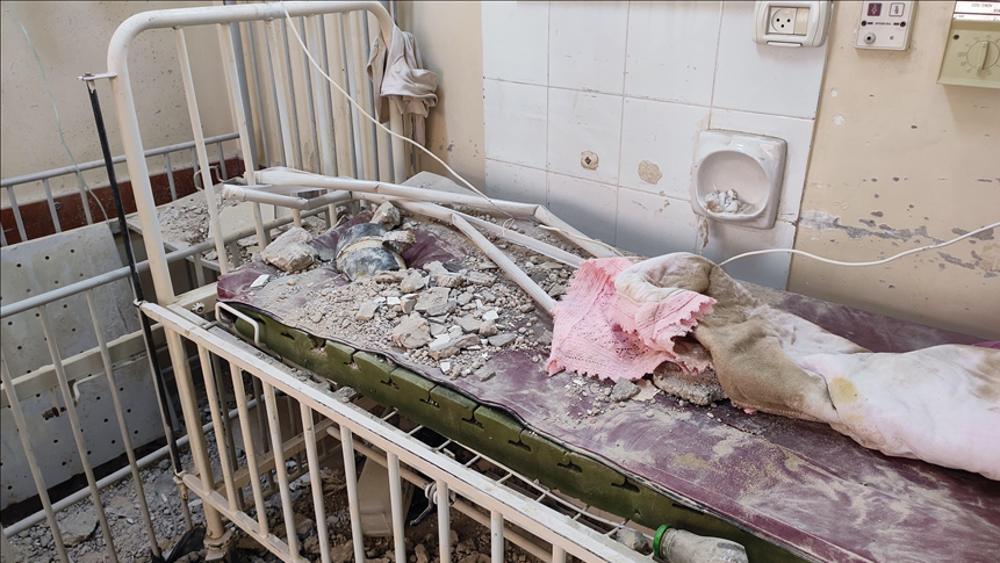Alwaght- The UN says only 13 out of 36 hospitals in the Gaza Strip are partially functional as Israeli occupation forces are targeting medical centers and staff amid heavily bombardment of the besieged territory.
The United Nations Office for the Coordination of Humanitarian Affairs (OCHA) said in a report on Tuesday that the services provided to patients in operational hospitals are “limited” as they have run out of bed capacity.
“The two major hospitals in southern Gaza are operating at three times above their bed capacity while facing critical shortages of basic supplies and fuel,” the report said. “Only one of these hospitals is in the north.”
“[Bed] occupancy rates are now reaching 206 percent in inpatient departments and 250 percent in intensive care units. Additionally, these hospitals are providing shelter to thousands of displaced people,” it added citing data from the Gaza Ministry of Health.
The report also said that the maternity department at Kamal Adwan Hospital in Beit Lahiya, north of Gaza, was hit on Monday, resulting in the death of several mothers.
The hospital remains surrounded by Israeli troops and tanks, and fighting has been reported in its vicinity for three consecutive days, the OCHA report added.
“The hospital is currently accommodating 65 patients, including 12 children in the intensive care unit (ICU) and six newborns in incubators. About 3,000 internally displaced persons (IDPs) remain trapped in the facility and are awaiting evacuation with extreme shortages of water, food, and power reported.”
Ahmed al-Kahlout, head of the Kamal Adwan Hospital, told Al Jazeera that “no one can leave” the hospital, which has been under siege by Israeli tanks for four days and they face “extremely difficult” conditions.
The OCHA report also said that for the sixth consecutive day, Al-Awda Hospital in Jabalya (northern Gaza) remains surrounded by Israeli forces as fighting has been reported in its vicinity.
“Reportedly, 250 doctors, patients, and their family members are trapped inside the hospital,” it said, adding that two medical staff were reportedly killed by Israeli forces while on duty inside the hospital on Saturday.
“Let us be clear: Al-Awda is a functioning hospital with medical staff and many patients in vulnerable condition. Targeting medical workers as they care for their patients is utterly reprehensible, utterly inhumane,” The Doctors Without Borders (Medecins Sans Frontieres, or MSF) said on X, formerly Twitter.
The vicinities of Al-Aqsa Hospital in Deir Al-Balah and Al-Amal Hospital in Khan Younis were also repeatedly bombarded on Sunday and Monday which impeded the access of dozens of casualties, according to the report.
Gaza hospitals are routinely viewed as mere military targets for the Israeli military. Israel has repeatedly claimed that Hamas locates its operational bases in tunnels under hospitals and other civilian infrastructure, a charge Hamas dismisses.
The Israeli army has so far failed to show convincing evidence of either Hamas-run tunnels or a military command center under the hospitals.
Elsewhere in its report, OCHA voiced concerns over the rapid spread of infectious diseases in the Gaza Strip due to the “overcrowding and poor sanitary conditions” at shelters provided by the United Nations Relief and Works Agency for Palestine Refugees in the Near East (UNRWA) in the south.
“There have been significant increases in some communicable diseases and conditions such as diarrhea, acute respiratory infections, skin infections, and hygiene-related conditions like lice,” the report said.
The report added that on average, UNRWA shelters located in the middle and southern areas are currently sheltering nine times the number of IDPs as was planned for.
Since the start of the offensive on October 7, Israel has killed at least 18,205 Palestinians, mostly women and children, and injured 49,645 others.
Thousands more are also missing and presumed dead under the rubble in Gaza, which is under “complete siege” by Israel.
Earlier, WHO Director-General Tedros Adhanom Ghebreyesus warned that “Gaza’s health system is on its knees and collapsing, with the risk expected to worsen with the deteriorating situation and approaching winter conditions.



























